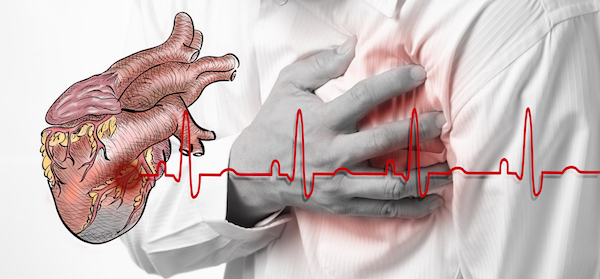When people hear of heart disease, their minds immediately think heart attack. But heart disease includes many conditions of the heart. Do you know what these are? Here are the main diseases that can affect your ticker, and how you can reduce your risk.
Clogged arteries
Your arteries are blood vessels that carry oxygenated blood from the heart to your body. They can become clogged by a build up of fatty, waxy tissue, which lines the arteries, making them narrower and more difficult for blood to flow. This fatty tissue is known as plaque, and if there is a significant build up, it can lead to angina or a heart attack.
Heart attack
A heart attack can be caused by other heart conditions (e.g. artery spasm), but is commonly caused by a build up of plaque in the arteries. If the plaque breaks open, a clot can form and block the artery. Without the much-needed oxygen in blood, heart tissue is damaged and can cause death.
Irregular heartbeat (arrhythmia)
An arrhythmia is an abnormal or irregular heartbeat. This can happen when there is abnormal electrical activity in the heart that makes the heart beat too fast (tachycardia), too slow (bradycardia), or irregularly. While some arrhythmias are not serious, others can be harmful and affect your heart’s function.
Cardiomyopathy
Cardiomyopathy, or abnormal heart muscle, makes it difficult for the heart to pump blood to the rest of your body. Over time, health problems such as high blood pressure, obesity and diabetes cause this serious condition, which can lead to heart failure.
Heart failure
Heart failure is when your heart cannot pump enough blood to meet your body’s needs. So over time it gets bigger and pumps faster to overcome the problem. However, this weakens the heart muscle and further lowers the amount of blood it can pump out. Most cases of heart failure are caused by coronary artery disease and heart attacks.
Congenital Heart Defect
This is a birth defect where, you can be born with a leaky valve or a damaged heart wall (which separate your heart chambers). Sometimes, it’s not until adulthood that the defect is noticed.
Not all congenital heart defects need treatment, however some may need medical intervention or surgery. Congenital heart defects are likely to cause arrhythmias, heart failure and infected valves, but there are ways to lower these conditions.
What to do if you have heart disease
Keep an eye out for symptoms. At first, they can be difficult to spot and may not even interfere with your daily life. But if not addressed, can worsen and be life-threatening.
So seek medical help if you notice that you are short of breath; you feel tired; or your belly, ankles, feet, or legs are swollen. In many cases, long-term treatment and a healthy lifestyle (diet and exercise) can help keep things under control.
Heart diseases can be treated with medicines, lifestyle changes, surgery or a transplant.
Read more at WebMD and the Heart Foundation.
Related articles:
Five health signs you should not ignore
Heart attack risk rises with BMI
Heart attack warning signs

